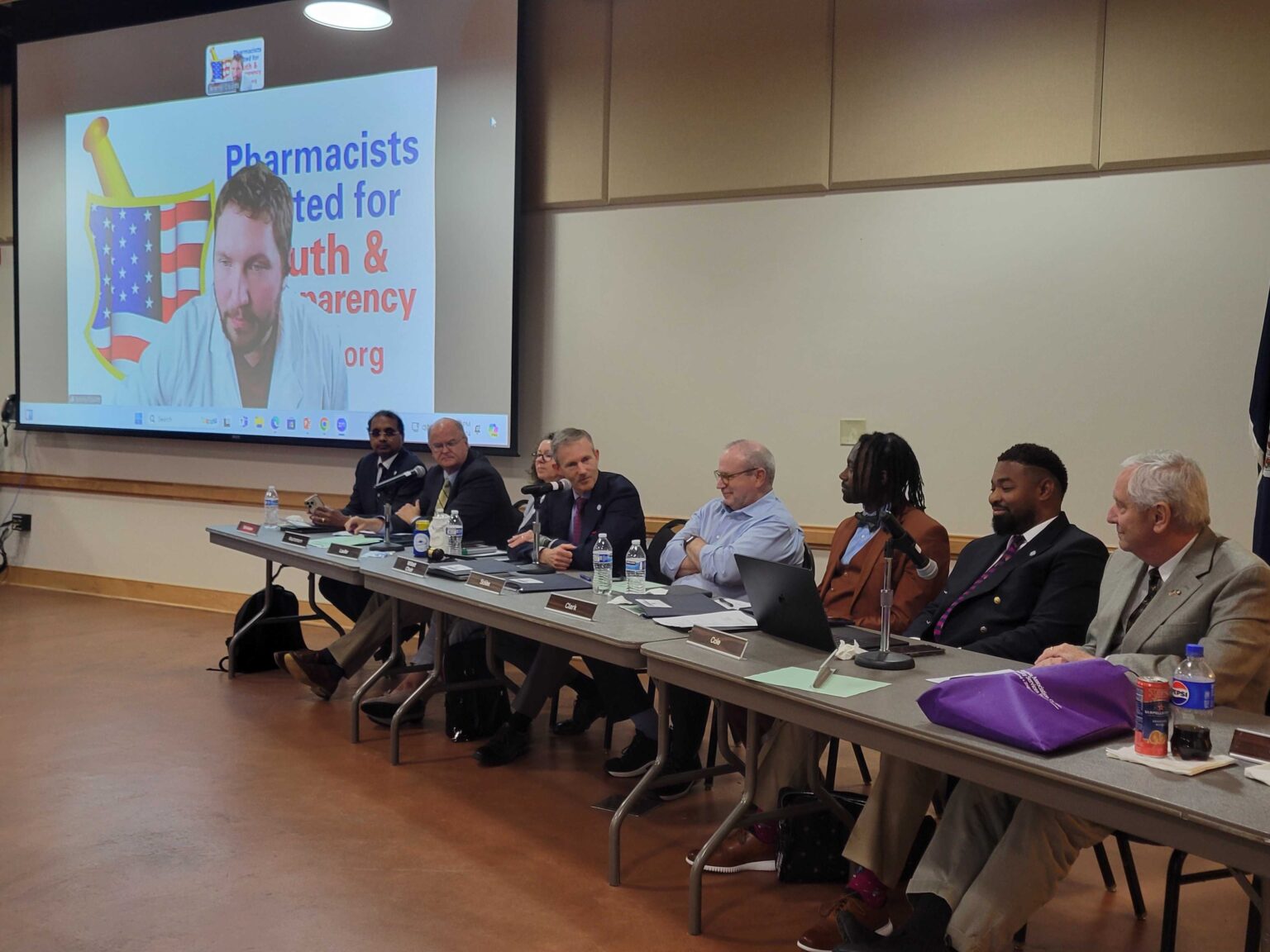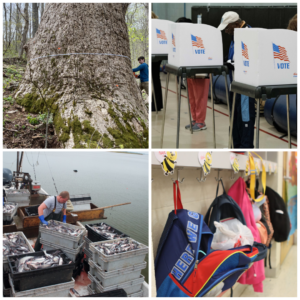19:03
News Story
In bipartisan push, Virginia lawmakers target rural healthcare crisis
Report recommends workforce investments, maternal care expansion, and transportation solutions to address growing challenges.

Blacksburg-area pharmacist Jeremy Counts, pictured on the projector screen, called in to the Sept. 16 meeting of the state’s rural health care committee to talk about challenges independent pharmacies face. He highlighted that these pharmacists will serve the areas of the state that national chains sometimes won’t. (Charlotte Rene Woods/Virginia Mercury)
Lawmakers criss-crossing rural Virginia this year heard a common refrain: Rural communities are struggling with healthcare workforce shortages and transportation challenges.
After months of meetings and site visits, the bipartisan House Select Committee on Advancing Rural and Small Town Health Care on Tuesday released its report with a slate of legislative and budgetary recommendations aimed at tackling those challenges.
Among the proposals are state-funded grants to help rural healthcare providers recruit professionals and increased investments in nursing education programs to build a stronger workforce.
To improve transportation access, the report proposes a new program to provide rides to free clinics and federally qualified health centers. Lawmakers point to Virginia’s existing non-emergency transportation program for Medicaid patients, run by the Department of Medical Assistance Services, as a potential model.
“We’ve got something that’s at least serving some people,” Committee Chair Rodney Willett, D-Henrico, said during a September meeting on the Eastern Shore. “Can we leverage that? Is there a way to expand that for non-Medicaid folks who have certain income levels or live in certain areas?
The committee also recommends requiring insurers to cover audio-only telehealth services. Willett previously told The Mercury that it would be a lifeline for people with limited broadband access, as well as older patients or those without computers who rely on phones for remote medical care.
Support for rural parents-to-be
A key section of the report focuses on maternal healthcare, aligning with a recently announced “momnibus” package of bills and budget proposals from Democratic lawmakers. Gov. Glenn Youngkin has also outlined his own plans to address maternal health, setting the stage for a bipartisan push in the 2025 legislative session.
With about 30% of Virginians living in areas with limited or no maternity care services, rural patients are often forced to travel long distances for care.
Midwives have become essential in filling these maternal care gaps providing perinatal care in homes, birth centers and rural hospitals. To bolster this workforce, the report recommends increased Medicaid reimbursement rates for midwives.
Midwives are often rooted in the communities they serve and more likely to stay, compared to some OB-GYN medical residents that may work in rural areas for a time before leaving for work elsewhere.
While Youngkin has committed to continuing funding for OB-GYN and family practice medical residencies — which are critical as rural hospitals close obstetrics units — the report calls for broader investment in medical residencies statewide.
Additionally, Youngkin on Tuesday announced his support for legislation to streamline out-of-state midwives seeking to practice in Virginia, further strengthening the maternal health workforce.
The report further recommends boosting funding for community college doula training programs, recognizing the critical role doulas play in supporting parents-to-be and improving health outcomes. This support is especially impactful for patients of color, who face disproportionate risks during pregnancy.
Data from the Centers for Disease Control and Prevention shows that Black women are significantly more likely to die from pregnancy complications when compared to white women. Studies point to racial bias as a contributing factor to poorer health outcomes for women of color, where doulas have been key advocates for patients’ needs and care.
Earlier this year, Youngkin signed a bill supporting health insurance coverage for doulas, acknowledging their role in maternal health. But he vetoed a separate measure that would have required unconscious bias training for nursing license renewals.
Bias training remains a key recommendation from the rural health committee, though it has faced resistance from some Republicans.
Committee member Del. Otto Wachsmann, R-Sussex, clarified the hesitation.
“The problem isn’t that Republicans are against cultural awareness training — I think everybody is really for that — but it’s putting another burden on the providers,” he said.
Earlier in the day, when Youngkin outlined maternal health policies that he supports, The Mercury asked what changes might make him reconsider the unconscious bias bill if reintroduced, he acknowledged the disparities in health outcomes for patients of color compared to white patients, but didn’t specify if he would support the bill.
“I think the right way to address it is to use the data that we gather and analyze to put forth really specific initiatives,” he said.
Youngkin was referring to an executive directive for the state’s health department to include pregnancy-related data on its Maternal and Child Health Data dashboard.
Looking forward
As lawmakers discussed the recommendations from their report, many reflected on the bipartisan companionship built during their work on the committee — a spirit of collaboration they hope to carry into the 2025 session.
“These were overnight trips,” Wachsmann said. “We found a lot of camaraderie together just breaking bread at the table and spending time together.”
Representing a rural district, Wachsmann has firsthand experience with the challenges highlighted in the report.
“I’ve watched as our areas have lost pharmacies,” Wachsmann said. “I’ve seen our grocery stores leave.”
He added that it was “refreshing” to see lawmakers from both rural and urban districts come together to focus on the unique struggles facing rural communities.
Willett, the committee chair, emphasized that while the proposals aren’t a complete solution, they represent important steps toward improving healthcare access.
Even if all of the committee’s roughly 30 proposals are eventually adopted, Willett said that rural healthcare issues won’t “go away” overnight.
“I can speak for all of us here in saying that we’re committed to staying on the case and making that progress,” he said.
YOU MAKE OUR WORK POSSIBLE.
Our stories may be republished online or in print under Creative Commons license CC BY-NC-ND 4.0. We ask that you edit only for style or to shorten, provide proper attribution and link to our website. AP and Getty images may not be republished. Please see our republishing guidelines for use of any other photos and graphics.




